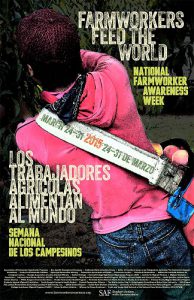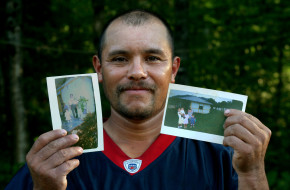We are in the midst of Farmworker Awareness Week and joining with partners and friends to express our appreciation for the contributions that farmworkers make to our health, economy, and communities as they provide the labor that brings food to our plates. Check out Student Action with Farmworkers to learn about some of their initiatives for Farmworker Awareness Week and what you can do to be in solidarity with farmworkers in Maine and across the country.

Here is a story from one of our Community Health Workers about a farmworker standing in solidarity with others:
A Matter of Perspective
I had a client who is Mexican. We’re about the same age and have many of the same interests. One day as we drove together to the doctor’s office, the client told me he was very worried for the people of Egypt and the unrest in their country, but also hopeful that the unrest would cause the government to adopt more humane policies, and that both Mexico and the USA had a long way to go towards having humanitarian regimes.
I had to find the right words, but finally told him that I had to reconsider a stereotype I had subconsciously held that a migrant farmworkers’ worldview may be limited to their own corner of the globe. After apologizing, he reassured me and said that “No, no, everyone makes mistakes like that,” and that he had to take interest in world events because of the poverty in his town at home.
He told me of a hypothetical situation. He said that if today he were to drop out of the sky in his hometown, the only way for him to feed his wife and children would be for him to go into the backcountry and support himself for a couple days while he cut enough firewood to carry to town. He reminded me that when your only option is to cut firewood and carry it on your back, you carry a lot of firewood at once. I asked him if the land around his town was forested like in Maine, and he said no, he lives in an arid, rocky environment in which trees don’t grow very large, and are very far apart. I asked him what he could earn cutting firewood, and he said that perhaps if the trip went well, he would be able to buy enough rice for him to have a meal and to provide two meals a day for his children and one for his wife while he went on his next trip.
Before we got to the doctor’s office I asked him what people do when they have a medical emergency at night in his town. He told me that there is a man with a truck who would drive them down out of the hills to the nearest clinic, a ride of 5 hours, but that the man charges too much and is rarely willing to offer assistance to those who cannot pay.
He reminded me that he paid attention to events abroad because he felt solidarity with people the world over who struggle to provide for their families, and said that he wouldn’t wish the horror of seeing their child not eat enough upon his worst enemy. We paused before we went into the clinic and he looked at the sky and said that working as a farm laborer in Maine felt to him like a day in the park compared to other things he’s needed to do to feed his family.



